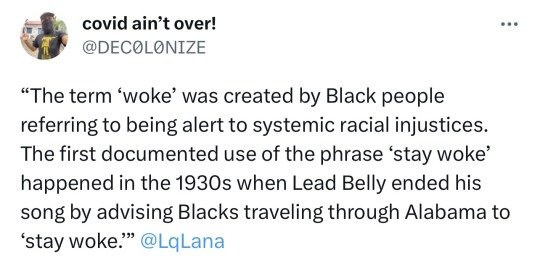Text
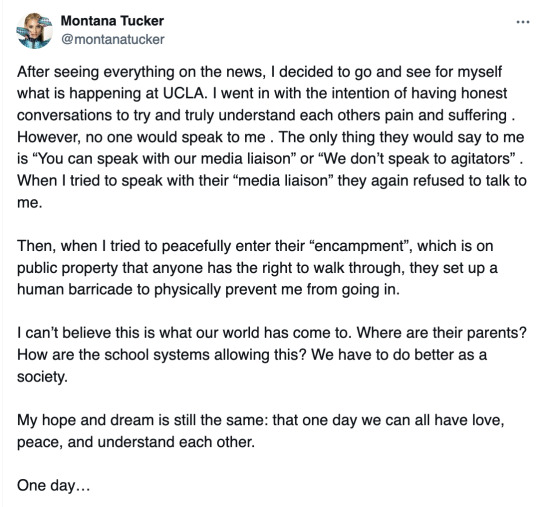
A right-wing agitator tried to speak with UCLA students about Palestine. They didn't take the bait.
57 notes
·
View notes
Note
You 🫵 are an antisemite
No I'm not, I'm literally a semite too 😭
I didn't think you'd steal our race too but here we r
0 notes
Text
It appears the Mossad are working full time now 💀 bro I'm a bearded 22 years old Muslim dude wdym Mysharona?
Besides it's dehumanizing to treat Jews like they can "do no wrong", they're just like everyone else, some are good & some are bad, you're the one who brought up her religion lol. Shows your way of thinking of people, really disgusting if u ask me

She quit her role as an Oxfam ambassador over this.
So, “decency”
219 notes
·
View notes
Note
Go back to where you came from
Btw this is from a Zionist meanwhile I'm Arab

2 notes
·
View notes
Note
Least racist Zionist 👆 their morality stops when the other party is brown
These people are deranged, it's crazy that they're living among us.
EDIT: check out their pinned post it's really disgusting
Do you think that the hostage should get relased in exchange for most of the Palestinian terrorists?
I think the hostages should be released in exchange for any # of terrorists because unlike soldiers, regular non combatant ppl r not playing cards. I however also think that Israel doesnt have to respect any agreement with a terrorist org and should set all the released terrorists on fire as soon as the hostages are returned <3
77 notes
·
View notes
Text
Literally me with this guy 😬

do you ever like a character so much that just looking at pictures of them is a bit embarrassing.
102 notes
·
View notes
Text
"These internal tyrants, whether they be in the form of public opinion or what will mother say, or brother, father, aunt, or relative of any sort; what will Mrs. Grundy, Mr. Comstock, the employer, the Board of Education say? All these busybodies, moral detectives, jailers of the human spirit, what will they say? Until woman has learned to defy them all, to stand firmly on her own ground and to insist upon her own unrestricted freedom.
Emma Goldman, The Tragedy of Woman’s Emancipation

She quit her role as an Oxfam ambassador over this.
So, “decency”
#meanwhile Scarlett Johansson claims to be a feminist#Hollywood will always be gross#free palestine#free gaza#gaza#Scarlett Johansson#politics#anarchy#emma goldman
219 notes
·
View notes
Text
Hindus you don't share the same struggle as us Zionists do. You do us a disservice when you lump us together. Fuck off
#these “anti semitism” accounts are obviously against racism#Zionists are really bad at manipulating people#cause they're used to people believing them blindly#politics
111 notes
·
View notes
Text

#meanwhile strippers get paid way more than your avg gf#despite girlfriends putting much more work & time in the relationship#if anything strippers are kinda free
58 notes
·
View notes
Text
#She's just too comfortable & doesn't care what happens to others#Those kind of people r the worst honestly#best thing is to just ignore them#people in the past had to FIGHT to get their rights#free palestine#TikTok#politics
56 notes
·
View notes
Note
i am sorry people are being cruel to you on here, but I need you to understand that it's not just random "zionists" coming into your inbox to shit on you for no reason, it's because you saw a post from a jewish blogger expressing anger and disappointment at antisemitism in leftist spaces and told them that they're being too sensitive and need to get over it. that's why people are angry with you.
I get their anger & disappointment it's completely justified, it's just that there are a current literal genocide against my people, and instead of trying to stop it these bloggers are chastising leftists and making us look anti semitic.
I don't know if this is similar but it's kinda like the White lives matter movement, YES white lives matter but it's only being used to distract people from issues concerning black people, which is racist.
Jewish lives matter too but they're not the ones going through ethnic cleansing at the moment.
Also fyi Arabs are also semites so i really don't see the racism part
2 notes
·
View notes
Photo
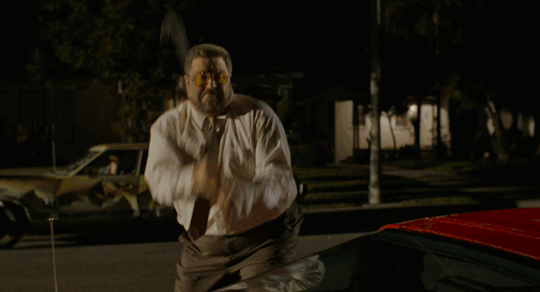
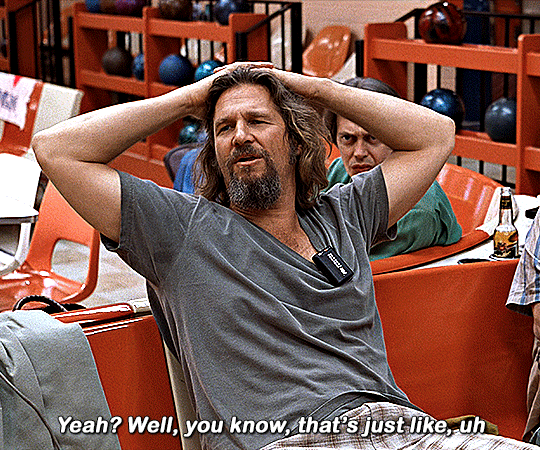
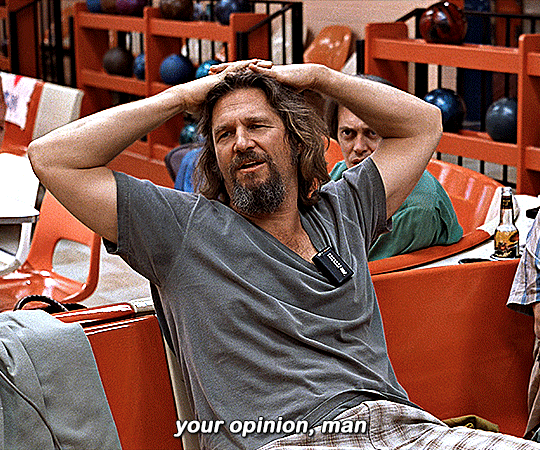
THE BIG LEBOWSKI (1998)
#Wtf walter what was that shit about Vietnam#wtf does anything has to do with Vietnam#“#💀💀💀💀#the big lebowski#movies
4K notes
·
View notes
Text
When you look at protests like these you don't focus at a single person spewing racist stuff, instead you should focus on the end goal which is to stop this apartheid state from committing war crimes against thousands of people most of whom are literal kids who barley even know why they're at war, once you ignore those innocents and hyperfocus on the small things you become racist yourself.
I'm Muslim myself, these protests are actually doing some good, those students are doing an honorable and a noble thing whether you like to admit it or not.
Just plz for the love of god let's focus on what matters here
I think something folks are missing is that a lot of, if not most of, people in the activist sphere are perfectly aware of the antisemitic undertones, messages, and individuals within their movements.
They just don't really care.
Antisemitism is seen by most left-ish goyim as a lesser prejudice, something that's not really an important issue. So when someone they're organizing with harasses, assaults or vandalizes random Jews, Jewish-owned businesses, JCCs, or shuln, they're perfectly happy to brush it off. It's a minor blemish on what they feel is a noble and righteous movement, not a big deal overall. You can point out the ways in which they are harming Jewish people and communities by spreading antisemitic talking points and obvious lies all you want, but they're still just going to reply with a non sequitur about Palestine.
The students at Columbia are perfectly aware of the naked hatred of Jews on display in the off-campus solidarity demonstration outside the gates. They are aware they are creating an environment in which the majority of Jewish students do not feel safe or comfortable being on campus.
They simply do not care.
943 notes
·
View notes
Text
Spoiler Alert for Shogun 01×10
I love how Yabushige accepted his death like a brave shitface, the guy just gave up on running from his fate and finally faced it with the most badass sipiku in television history.
I hope they continue the show by adapting the other novels
8 notes
·
View notes
Text

A.2.9 What sort of society do anarchists want?
Anarchists desire a decentralised society, based on free association. We consider this form of society the best one for maximising the values we have outlined above — liberty, equality and solidarity. Only by a rational decentralisation of power, both structurally and territorially, can individual liberty be fostered and encouraged. The delegation of power into the hands of a minority is an obvious denial of individual liberty and dignity. Rather than taking the management of their own affairs away from people and putting it in the hands of others, anarchists favour organisations which minimise authority, keeping power at the base, in the hands of those who are affected by any decisions reached.
Free association is the cornerstone of an anarchist society. Individuals must be free to join together as they see fit, for this is the basis of freedom and human dignity. However, any such free agreement must be based on decentralisation of power; otherwise it will be a sham (as in capitalism), as only equality provides the necessary social context for freedom to grow and development. Therefore anarchists support directly democratic collectives, based on “one person one vote” (for the rationale of direct democracy as the political counterpart of free agreement, see section A.2.11 — Why do most anarchists support direct democracy?).
We should point out here that an anarchist society does not imply some sort of idyllic state of harmony within which everyone agrees. Far from it! As Luigi Galleani points out, ”[d]isagreements and friction will always exist. In fact they are an essential condition of unlimited progress. But once the bloody area of sheer animal competition — the struggle for food — has been eliminated, problems of disagreement could be solved without the slightest threat to the social order and individual liberty.” [The End of Anarchism?, p. 28] Anarchism aims to “rouse the spirit of initiative in individuals and in groups.” These will “create in their mutual relations a movement and a life based on the principles of free understanding” and recognise that ”variety, conflict even, is life and that uniformity is death.” [Peter Kropotkin, Anarchism, p. 143]
Therefore, an anarchist society will be based upon co-operative conflict as ”[c]onflict, per se, is not harmful… disagreements exist [and should not be hidden] … What makes disagreement destructive is not the fact of conflict itself but the addition of competition.” Indeed, “a rigid demand for agreement means that people will effectively be prevented from contributing their wisdom to a group effort.” [Alfie Kohn, No Contest: The Case Against Competition, p. 156] It is for this reason that most anarchists reject consensus decision making in large groups (see section A.2.12).
So, in an anarchist society associations would be run by mass assemblies of all involved, based upon extensive discussion, debate and co-operative conflict between equals, with purely administrative tasks being handled by elected committees. These committees would be made up of mandated, recallable and temporary delegates who carry out their tasks under the watchful eyes of the assembly which elected them. Thus in an anarchist society, “we’ll look after our affairs ourselves and decide what to do about them. And when, to put our ideas into action, there is a need to put someone in charge of a project, we’ll tell them to do [it] in such and such a way and no other … nothing would be done without our decision. So our delegates, instead of people being individuals whom we’ve given the right to order us about, would be people … [with] no authority, only the duty to carry out what everyone involved wanted.” [Errico Malatesta, Fra Contadini, p. 34] If the delegates act against their mandate or try to extend their influence or work beyond that already decided by the assembly (i.e. if they start to make policy decisions), they can be instantly recalled and their decisions abolished. In this way, the organisation remains in the hands of the union of individuals who created it.
This self-management by the members of a group at the base and the power of recall are essential tenets of any anarchist organisation. The key difference between a statist or hierarchical system and an anarchist community is who wields power. In a parliamentary system, for example, people give power to a group of representatives to make decisions for them for a fixed period of time. Whether they carry out their promises is irrelevant as people cannot recall them till the next election. Power lies at the top and those at the base are expected to obey. Similarly, in the capitalist workplace, power is held by an unelected minority of bosses and managers at the top and the workers are expected to obey.
In an anarchist society this relationship is reversed. No one individual or group (elected or unelected) holds power in an anarchist community. Instead decisions are made using direct democratic principles and, when required, the community can elect or appoint delegates to carry out these decisions. There is a clear distinction between policy making (which lies with everyone who is affected) and the co-ordination and administration of any adopted policy (which is the job for delegates).
These egalitarian communities, founded by free agreement, also freely associate together in confederations. Such a free confederation would be run from the bottom up, with decisions following from the elemental assemblies upwards. The confederations would be run in the same manner as the collectives. There would be regular local regional, “national” and international conferences in which all important issues and problems affecting the collectives involved would be discussed. In addition, the fundamental, guiding principles and ideas of society would be debated and policy decisions made, put into practice, reviewed, and co-ordinated. The delegates would simply “take their given mandates to the relative meetings and try to harmonise their various needs and desires. The deliberations would always be subject to the control and approval of those who delegated them” and so “there would be no danger than the interest of the people [would] be forgotten.” [Malatesta, Op. Cit., p. 36]
Action committees would be formed, if required, to co-ordinate and administer the decisions of the assemblies and their congresses, under strict control from below as discussed above. Delegates to such bodies would have a limited tenure and, like the delegates to the congresses, have a fixed mandate — they are not able to make decisions on behalf of the people they are delegates for. In addition, like the delegates to conferences and congresses, they would be subject to instant recall by the assemblies and congresses from which they emerged in the first place. In this way any committees required to co-ordinate join activities would be, to quote Malatesta’s words, “always under the direct control of the population” and so express the “decisions taken at popular assemblies.” [Errico Malatesta: His Life and Ideas, p. 175 and p. 129]
Most importantly, the basic community assemblies can overturn any decisions reached by the conferences and withdraw from any confederation. Any compromises that are made by a delegate during negotiations have to go back to a general assembly for ratification. Without that ratification any compromises that are made by a delegate are not binding on the community that has delegated a particular task to a particular individual or committee. In addition, they can call confederal conferences to discuss new developments and to inform action committees about changing wishes and to instruct them on what to do about any developments and ideas.
In other words, any delegates required within an anarchist organisation or society are not representatives (as they are in a democratic government). Kropotkin makes the difference clear:
“The question of true delegation versus representation can be better understood if one imagines a hundred or two hundred men [and women], who meet each day in their work and share common concerns … who have discussed every aspect of the question that concerns them and have reached a decision. They then choose someone and send him [or her] to reach an agreement with other delegates of the same kind… The delegate is not authorised to do more than explain to other delegates the considerations that have led his [or her] colleagues to their conclusion. Not being able to impose anything, he [or she] will seek an understanding and will return with a simple proposition which his mandatories can accept or refuse. This is what happens when true delegation comes into being.” [Words of a Rebel, p. 132]
Unlike in a representative system, power is not delegated into the hands of the few. Rather, any delegate is simply a mouthpiece for the association that elected (or otherwise selected) them in the first place. All delegates and action committees would be mandated and subject to instant recall to ensure they express the wishes of the assemblies they came from rather than their own. In this way government is replaced by anarchy, a network of free associations and communities co-operating as equals based on a system of mandated delegates, instant recall, free agreement and free federation from the bottom up.
Only this system would ensure the “free organisation of the people, an organisation from below upwards.” This “free federation from below upward” would start with the basic “association” and their federation “first into a commune, then a federation of communes into regions, of regions into nations, and of nations into an international fraternal association.” [Michael Bakunin, The Political Philosophy of Bakunin, p. 298] This network of anarchist communities would work on three levels. There would be “independent Communes for the territorial organisation, and of federations of Trade Unions [i.e. workplace associations] for the organisation of men [and women] in accordance with their different functions… [and] free combines and societies … for the satisfaction of all possible and imaginable needs, economic, sanitary, and educational; for mutual protection, for the propaganda of ideas, for arts, for amusement, and so on.” [Peter Kropotkin, Evolution and Environment, p. 79] All would be based on self-management, free association, free federation and self-organisation from the bottom up.
By organising in this manner, hierarchy is abolished in all aspects of life, because the people at the base of the organisation are in control, not their delegates. Only this form of organisation can replace government (the initiative and empowerment of the few) with anarchy (the initiative and empowerment of all). This form of organisation would exist in all activities which required group work and the co-ordination of many people. It would be, as Bakunin said, the means “to integrate individuals into structures which they could understand and control.” [quoted by Cornelius Castoriadis, Political and Social Writings, vol. 2, p. 97] For individual initiatives, the individual involved would manage them.
As can be seen, anarchists wish to create a society based upon structures that ensure that no individual or group is able to wield power over others. Free agreement, confederation and the power of recall, fixed mandates and limited tenure are mechanisms by which power is removed from the hands of governments and placed in the hands of those directly affected by the decisions.
For a fuller discussion on what an anarchist society would look like see section I. Anarchy, however, is not some distant goal but rather an aspect of current struggles against oppression and exploitation. Means and ends are linked, with direct action generating mass participatory organisations and preparing people to directly manage their own personal and collective interests. This is because anarchists, as we discuss in section I.2.3, see the framework of a free society being based on the organisations created by the oppressed in their struggle against capitalism in the here and now. In this sense, collective struggle creates the organisations as well as the individual attitudes anarchism needs to work. The struggle against oppression is the school of anarchy. It teaches us not only how to be anarchists but also gives us a glimpse of what an anarchist society would be like, what its initial organisational framework could be and the experience of managing our own activities which is required for such a society to work. As such, anarchists try to create the kind of world we want in our current struggles and do not think our ideas are only applicable “after the revolution.” Indeed, by applying our principles today we bring anarchy that much nearer.
#faq#anarchy faq#revolution#anarchism#daily posts#communism#anti capitalist#anti capitalism#late stage capitalism#politics
12 notes
·
View notes
